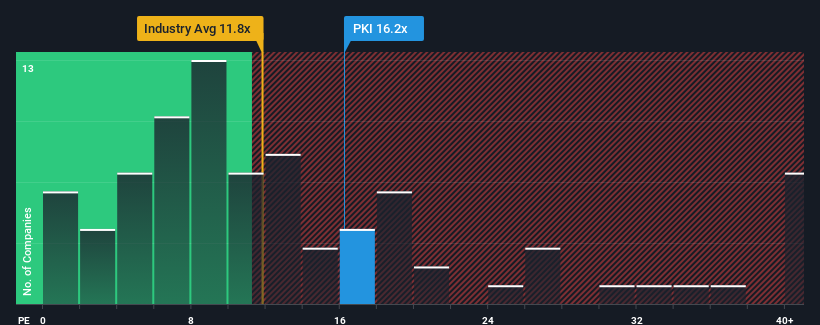- Canada
- /
- Oil and Gas
- /
- TSX:PKI
Investors Aren't Entirely Convinced By Parkland Corporation's (TSE:PKI) Earnings

It's not a stretch to say that Parkland Corporation's (TSE:PKI) price-to-earnings (or "P/E") ratio of 16.2x right now seems quite "middle-of-the-road" compared to the market in Canada, where the median P/E ratio is around 15x. Although, it's not wise to simply ignore the P/E without explanation as investors may be disregarding a distinct opportunity or a costly mistake.
With its earnings growth in positive territory compared to the declining earnings of most other companies, Parkland has been doing quite well of late. One possibility is that the P/E is moderate because investors think the company's earnings will be less resilient moving forward. If not, then existing shareholders have reason to be feeling optimistic about the future direction of the share price.
View our latest analysis for Parkland

What Are Growth Metrics Telling Us About The P/E?
Parkland's P/E ratio would be typical for a company that's only expected to deliver moderate growth, and importantly, perform in line with the market.
Taking a look back first, we see that the company managed to grow earnings per share by a handy 12% last year. This was backed up an excellent period prior to see EPS up by 249% in total over the last three years. So we can start by confirming that the company has done a great job of growing earnings over that time.
Shifting to the future, estimates from the eleven analysts covering the company suggest earnings should grow by 27% per year over the next three years. That's shaping up to be materially higher than the 8.9% per annum growth forecast for the broader market.
In light of this, it's curious that Parkland's P/E sits in line with the majority of other companies. It may be that most investors aren't convinced the company can achieve future growth expectations.
The Key Takeaway
While the price-to-earnings ratio shouldn't be the defining factor in whether you buy a stock or not, it's quite a capable barometer of earnings expectations.
We've established that Parkland currently trades on a lower than expected P/E since its forecast growth is higher than the wider market. There could be some unobserved threats to earnings preventing the P/E ratio from matching the positive outlook. It appears some are indeed anticipating earnings instability, because these conditions should normally provide a boost to the share price.
And what about other risks? Every company has them, and we've spotted 1 warning sign for Parkland you should know about.
You might be able to find a better investment than Parkland. If you want a selection of possible candidates, check out this free list of interesting companies that trade on a low P/E (but have proven they can grow earnings).
If you're looking to trade Parkland, open an account with the lowest-cost platform trusted by professionals, Interactive Brokers.
With clients in over 200 countries and territories, and access to 160 markets, IBKR lets you trade stocks, options, futures, forex, bonds and funds from a single integrated account.
Enjoy no hidden fees, no account minimums, and FX conversion rates as low as 0.03%, far better than what most brokers offer.
Sponsored ContentNew: Manage All Your Stock Portfolios in One Place
We've created the ultimate portfolio companion for stock investors, and it's free.
• Connect an unlimited number of Portfolios and see your total in one currency
• Be alerted to new Warning Signs or Risks via email or mobile
• Track the Fair Value of your stocks
Have feedback on this article? Concerned about the content? Get in touch with us directly. Alternatively, email editorial-team (at) simplywallst.com.
This article by Simply Wall St is general in nature. We provide commentary based on historical data and analyst forecasts only using an unbiased methodology and our articles are not intended to be financial advice. It does not constitute a recommendation to buy or sell any stock, and does not take account of your objectives, or your financial situation. We aim to bring you long-term focused analysis driven by fundamental data. Note that our analysis may not factor in the latest price-sensitive company announcements or qualitative material. Simply Wall St has no position in any stocks mentioned.
About TSX:PKI
Parkland
Operates food and convenience stores in Canada, the United States, and internationally.
Average dividend payer slight.
Similar Companies
Market Insights
Community Narratives



